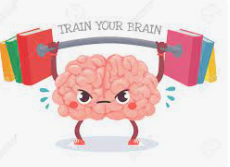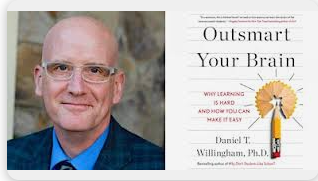Understanding How Students Learn
- Lori Bock
- Aug 30, 2023
- 3 min read
As many of you know, Lori and Paige developed a passion last year for the work of Daniel Willingham, a Professor of Psychology at the University of Virginia. Lori hosted Willingham during one of her secondary content PD days at JMB last week. Following this full day session, Dr. Stauffer, Dr. Briggs, and I met with Willingham and Lori's team to begin to formulate a plan around key concepts on how students learn and how we can incorporate those strategies into everyday lessons in WCPS. We'd like to begin with a book study centered around Outsmart Your Brain as a first step into exploring this initiative. To provide a little more background, this blog post highlights Willingham's key points.
Education is a complex and ever-evolving field, with researchers continually seeking ways to enhance the learning experience for students. One prominent figure in this realm is Daniel Willingham, a cognitive psychologist and professor known for his insights into how students learn. Willingham's work bridges the gap between cognitive science and education, providing educators with valuable tools to optimize their teaching methods. In this blog post, we'll delve into some of Daniel Willingham's main points about how students learn.
1. Learning Styles Misconception: One of Willingham's central messages is debunking the myth of learning styles. Many educators have been led to believe that tailoring instruction to individual learning styles—such as visual, auditory, or kinesthetic—will enhance learning outcomes. However, Willingham's research suggests that there's limited evidence to support this notion. Instead, he emphasizes that effective teaching methods should align with the content being taught rather than catering to perceived learning styles.
2. Cognitive Load Theory: Willingham's work emphasizes the importance of understanding cognitive load theory. This theory posits that the human brain has limited capacity for processing information. Educators should strive to present information in a way that optimizes cognitive load—avoiding overwhelming students with too much information at once. This involves breaking down complex concepts into smaller, more manageable chunks and providing opportunities for spaced repetition to reinforce learning.
3. Memory and Retrieval: Willingham stresses the significance of memory and retrieval in the learning process. He advocates for "retrieval practice," which involves actively recalling information from memory rather than simply reviewing notes or materials. Regular self-quizzing or testing has been shown to enhance long-term retention. This approach is rooted in the idea that the act of recalling information strengthens memory pathways, making it easier to retrieve that information in the future.
4. Importance of Prior Knowledge: Willingham emphasizes the role of prior knowledge in learning. He suggests that learning is more effective when new information is connected to existing knowledge and concepts. Educators should assess students' existing knowledge and build upon it, creating a scaffold for deeper understanding. This approach helps students grasp new concepts more readily and reinforces the interconnected nature of learning.
5. Critical Thinking and Problem Solving: While content knowledge is important, Willingham also underscores the need to develop critical thinking and problem-solving skills. He believes that teaching students how to think critically—evaluating evidence, considering multiple perspectives, and drawing reasoned conclusions—is essential for their success in an increasingly complex world. Educators should incorporate activities that promote analytical thinking and real-world application of knowledge.
6. Motivation and Engagement: Willingham acknowledges the role of motivation in learning. He highlights that students are more likely to learn deeply when they are engaged and motivated to understand the material. While there's no one-size-fits-all approach to motivation, incorporating real-world relevance, choice, and a sense of accomplishment into the learning experience can foster greater engagement.
7. Feedback and Iterative Learning: Providing effective feedback is another key aspect of Willingham's insights. Constructive feedback helps students understand their strengths and areas for improvement, guiding them toward mastery. Additionally, he emphasizes the iterative nature of learning—encouraging students to reflect on feedback, making adjustments when necessary, and continuously refining their understanding.
Daniel Willingham's research provides valuable guidance for educators seeking to enhance their teaching methods and promote effective student learning. By understanding the debunked learning styles myth, embracing cognitive load theory, prioritizing memory, and retrieval practices, building on prior knowledge, fostering critical thinking, motivating students, and offering meaningful feedback, educators can create a dynamic learning environment that empowers students to thrive academically and beyond.
I'm looking forward to collaborating with all of you this year as we explore these key concepts.









Comments